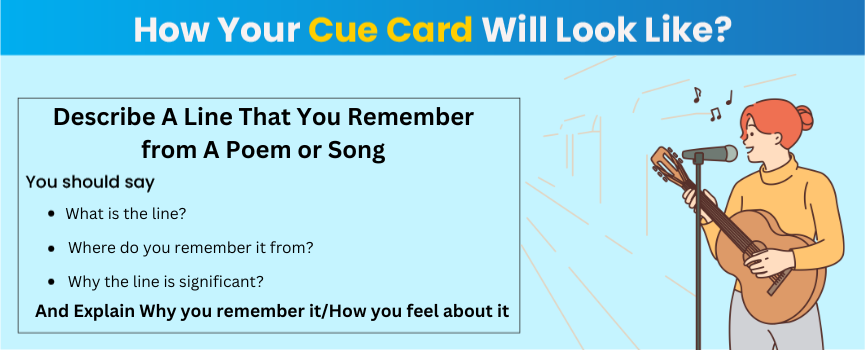Describe A Line That You Remember from A Poem or Song- IELTS Cue Card
Last updated: Sep 5, 2025In the IELTS cue card, getting a topic like “describe a line that you remember from a poem or song” can become a little challenging because of how personal and subjective the choice can be. It not just requires you to recall the line, but also needs you to express the feeling and thoughts it evoke. And this can get even more difficult if you are not used to speaking in English regularly. So to help you understand how you can answer this in IELTS speaking part 2 to get Band score of 8+, we have listed three samples. What’s more? You will also discover a few follow-up questions along with their ideal answers and tips for better preparation. Read on!

Table of Contents
Introduction to IELTS Cue Cards
IELTS Cue Card, also known as the “Long Turn”, is the second part of the IELTS speaking section where your ability to speak in English on a given topic at length is assessed. Moreover, this also checks your fluency, coherence, vocabulary, and correct use of grammar in a structured response.
In total, you will get 3-4 minutes for this task including the 1-minute preparation time to understand the topic and prepare your answer. For the IELTS cue card topic “describe a line that you remember from a poem or song”, you will have to pick a line that resonates with you, both emotionally and intellectually, and then explain why it is memorable for you.

How to Answer the Cue Card?
To answer IELTS cue cards effectively for a band score of 8+, you can start by paraphrasing the topic and providing specific details and examples. Additionally, you can also try to brainstorm ideas and write down key points during your 1-minute preparation time. Here are a few more ways to answer IELTS speaking part 2 effectively:
- Start by smoothly introducing the topic by giving a general statement like “To start with, I think...”
- In the main body, you can try to elaborate on the idea or the topic with the help of examples. This will help you add depth and detail to your response.
- When you wrap up your response, you can try to reflect on the feelings and significance of your experience.
In addition to this, on your cue card, you will also get a few pointers that can help you answer much more effectively. Using these points, you can try to speak for a full two minutes and expand each of them in detail. For the topic “describe a line that you remember from a poem or song”, you can get these points:
- What is the line?
- Where do you remember it from?
- Why the line is significant?
- Why you remember it/How you feel about it
Here is what your IELTS cue card will look like for this topic:

Now, let’s take a look at three samples of the topic “describe a line that you remember from a poem or song” that includes all four of these points.
Describe A Line That You Remember From A Poem Or Song - Sample 1
This first sample will help you understand how to choose a line you can talk about in detail and how you can use personal examples in your response. Take a look:
Introduction
To start with, I would like to talk about a song that I listen to very often, almost regularly. This song is “The End” by The Beatles, and it has this one particular line that has stayed with me for years.
What is the line?
The line is “And in the end, the love you take is equal to the love you make”, a simple yet profound statement that I resonate with deeply. It basically means that the amount of love and kindness you receive in life is directly related to the love and kindness you give to others.
Where do you remember it from?
I first heard this line and the song at a friend’s house when I was a teenager. It was from a playlist that my friend used to play when we were together, and over time, its lyrics just stuck with me. Especially this last line. And ever since then, I have come across it in books, social media, and even motivational talks. I think all this exposure increased its significance for me even more.
Why the line is significant?
What makes this line so significant for me is how simple and universal what it says is. It makes me remember that life is all about giving, and the kind of energy I will put out will come back to me. Very much like Karma.
Why you remember it/How you feel about it
The reason why I remember this line is that I use it as a guiding principle every time I face a challenge or conflict in my life. This line makes me feel hopeful and reminds me that love and compassion can make a difference.
Conclusion
So yes, this line, “And in the end, the love you take is equal to the love you make” from “The End” by The Beatles, has left a lasting impression on me. It is more than just a lyric; it is a philosophy I stand by to this date.

 Access speaking Mock Test
Access speaking Mock Test Describe A Line That You Remember From A Poem Or Song - Sample 2
This next sample is more focused on using a wider range of vocabulary words, so that you can improve your scores in lexical resources in the IELTS speaking section. Check it out:
Introduction
A line that I would like to talk about today is from a very famous and timeless poem called “If” by Rudyard Kipling. A poem that has left a profound impact on me ever since I first read it and has lingered in my mind for years.
What is the line?
Out of all the lines from the poem, there is this one phrase that I think about more often than not: “If you can meet with Triumph and Disaster and treat those two impostors just the same.” Essentially, this line is about the importance of maintaining composure and balance regardless of success or failure.
Where do you remember it from?
I first came across this line during my literature class in high school when we were studying classic English poetry. Our teacher was emphasising the relevance of this in real life, and ever since then, it has resurfaced in my thoughts time and time again.
Why the line is significant?
I think the reason why this line plays a significant role in my life is that it encapsulates a mature perspective of the ups and downs of life. It has helped me understand the virtue of stoicism—the ability to remain calm and unaffected by external circumstances.
Why you remember it/How you feel about it
I remember this particular line from the poem because it has given me a sense of inner strength and perspective. More than that, it also helps me face setbacks or moments of elation and reminds me that I should not get carried away by emotions.
Conclusion
So, yes, to conclude, this eloquent and thought-provoking line from Kipling’s “If” poem is what influences my mindset profoundly. And it helps me navigate my life’s fluctuations with grace and balance.

Describe A Line That You Remember From A Poem Or Song - Sample 3
This last sample for the IELTS speaking part 2 topic “describe a line that you remember from a poem or song” is the ideal 8+ band score cue card response. You can take this as a reference during your preparation.
Introduction
One line that comes into my mind is from a poem called "Still I Rise" by Maya Angelou. A poem that is not just a poem or a part of literature for me, it is a message that gives me a sense of strength, dignity, and resilience.
What is the line?
The line that I remember very clearly is “You may trod me in the very dirt, but still, like dust, I'll rise”, and much more specifically the line “But still, like dust, I’ll rise.” I believe this is a powerful metaphor that compares resilience to dust. This is such a vivid and empowering image, and it speaks to the unbreakable spirit of someone who refuses to be defeated.
Where do you remember it from?
I remember it from my university literature class when we were studying African-American literature and the theme of empowerment through adversity. I was so moved by this line that I even wrote it down and stuck it on the wall of my room as a daily reminder.
Why the line is significant?
And another reason why this line plays such a significant role in my life is because of the inner strength it conveys. It is not just about surviving difficult situations, but also about rising above them with dignity. I think the use of the word “dust” as a metaphor is brilliant, because it’s something so ordinary, yet impossible to keep down.
Why you remember it / How you feel about it
The main reason why I still remember this line is because of how empowering it feels, especially on days when I feel a little overwhelmed or disheartened. It reminds me that setbacks are a part of life, but they do not defy who I am.
Conclusion
To sum up, this line from Maya Angelou’s “Still I Rise” has become a personal mantra for me. It reminds me to carry myself with pride and strength, no matter what life throws my way.


Lexical Resources
In the IELTS speaking section, 25% of the total score is based on lexical resources, which is your ability to use a wide range of vocabulary accurately and appropriately in your response. In the table below, we have listed all the phrases and words from the sample answer above to help you expand your vocabulary for IELTS, along with their meaning.
| Word | Meaning |
|---|---|
| Profound | Very deep or serious |
| Resonate | To have a strong effect or connection with someone |
| Exposure | Being introduced to or experiencing something new |
| Compassion | Feeling kindness and wanting to help others |
| Impression | A feeling or idea you get about something or someone |
| Lingered | Stayed for a long time |
| Composure | Staying calm, especially in difficult situations |
| Resurfaced | Came back or appeared again |
| Encapsulates | Shows or expresses the main idea in a clear way |
| Virtue | A good moral quality or behavior |
| Eloquent | Speaking or writing clearly and effectively |
| Fluctuations | Changes that go up and down |
| Grace | Being polite, calm, and controlled |
| Resilience | The ability to recover quickly from problems |
| Vivid | Very clear, bright, or detailed |
| Empowering | Making someone feel stronger and more confident |
| Unbreakable | Impossible to break or destroy |
| Adversity | Difficulties or problems |
| Disheartened | Feeling sad and losing hope |
Follow-up Questions
Once you are done with IELTS speaking part 2, the examiner will ask you a few follow-up questions on the same topic, “describe a line that you remember from a poem or song” for part 3. These are broader questions that will help the examiner assess how well you can engage in a deeper and more abstract discussion.
1. How do emotional experiences affect our memory of songs or poems?
I believe emotional experiences can significantly enhance our memory of songs or poems. My reason is that every time we connect a song or its line to a strong emotion like happiness, heartbreak, or nostalgia, our brain tries to store it more vividly. For example, if a song is playing during an important life event like graduation or a wedding, then we are more likely to remember the melody and the lyrics.
2. Do you think lyrics or poems like that can actually influence how people behave or make decisions?
Yes, I think lyrics and poems like that can influence people’s behaviour and decisions because they have the power to impact their thoughts, which in turn may influence their actions. A great example of this is motivational songs; when we play them during a tough time, they can encourage us to stay strong.
3. Can you explain how music and lyrics can be used to make people feel a certain way?
Both music and lyrics work together to evoke different emotions in us. I think the melody is what sets the mood, whereas the lyrics generally tell us a story or express a feeling that we can relate to.
4. How do songs or poems reflect the culture of a particular country?
Most of the time, both songs and poems carry themes, language, and even the value of a country’s culture. There are folk songs in India that are based on regional customs and dialects. Similarly, in America, there are protest songs from the 60s which express political and cultural shifts.
5. How has the way we consume music and poetry changed over time?
I believe technology has drastically changed the way we consume music and poetry over time. Back in the old days, we used to listen to music on the radio, on physical albums and similarly used to read poetry in books. But today, with streaming platforms and social media, we can instantly access millions of songs and poems from around the world.
Master the IELTS exam with our Prep Boost
What’s included:
- Pre-recorded video lectures
- Advance Study Materials
- Detailed Feedback Report
Tips to Excel in IELTS Cue Card
To excel in IELTS cue cards, you can follow these tips below:
- While talking about the topic, try to maintain fluency and coherence by using connecting words like “in addition to this,” “moreover,” or “however.”
- Try to give more real life examples whenever it is possible. This will help you speak naturally about something you already know and can, in turn, impress the examiner.
- You can also try to deconstruct the card during your 1-minute preparation time by identifying the theme, required tense, and specific details that are requested.
- Also, try to manage your pace and avoid rushing. Speak at a natural and steady speed with clear pronunciation.
- Lastly, use an IELTS band score calculator to guide your preparation and know the area you need to improve in.
Conclusion
In conclusion, to get a band score of 8+ in the IELTS cue card topic “describe a line that you remember from a poem or song”, it is really important that you choose a meaningful line that you can talk about confidently. In addition to this, you can also take online IELTS Classes from Gradding to improve your speaking skills, get personalised feedback, and practice with expert guidance to boost your overall performance in the IELTS Speaking test.
0 comments

Practice Makes a Man Perfect!Take FREE ielts Mock Tests
Start FREE Mock TestPredict your IELTS Band

98% students got exact IELTS Band
What is your Target IELTS Band?
Get familiar with the Real IELTS Exam for Free!
Start Free Mock TestWe are available in :
BangaloreAhmedabadJaipurHyderabadKeralaPuneChandigarhMumbaiGurgaonChennaiKolkataTrivandrumNoidaKochiCalicutKottayamKollamThrissurIndoreUdaipurdisclaimer:logos and other registered trademarks of universities used on this platform are held by their respective owners. Gradding does not claim ownership or association on them, and their use is purely for informational and illustrative purposes.
















